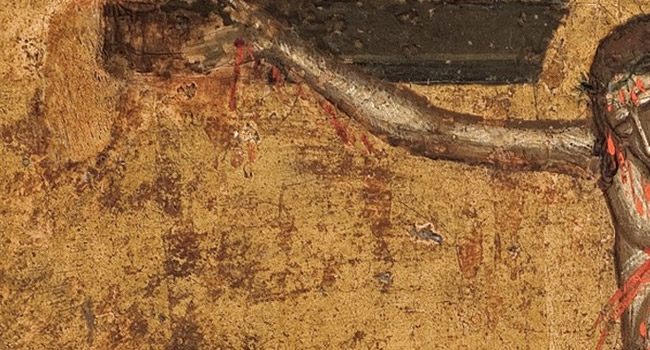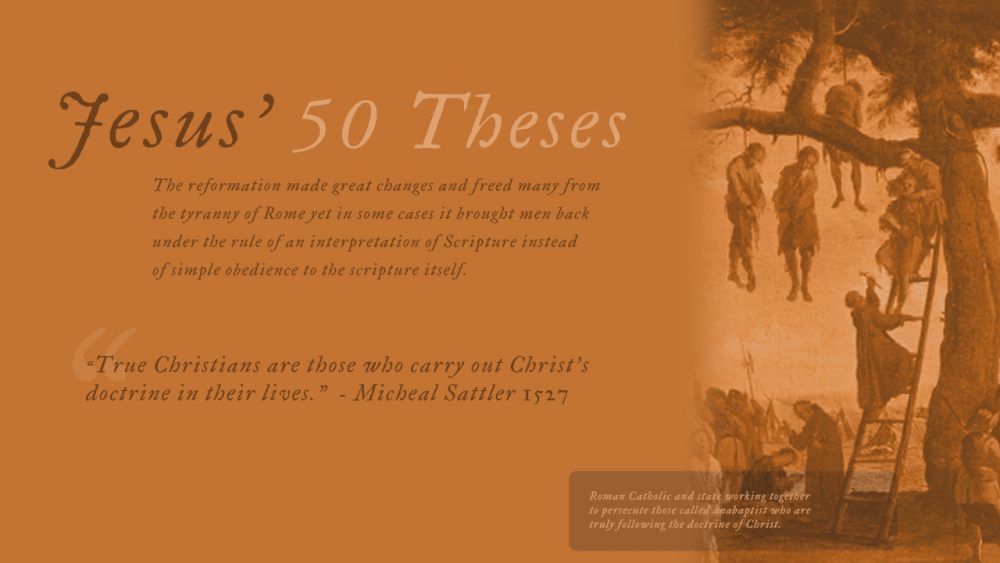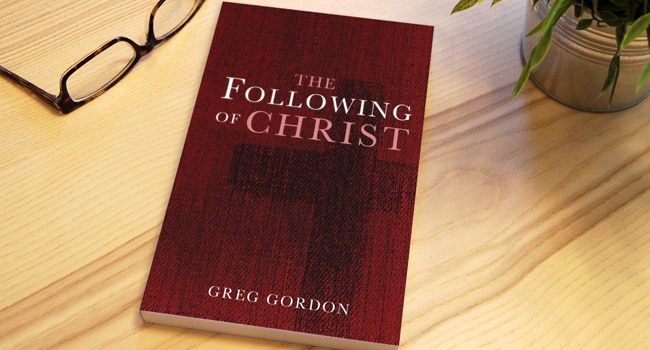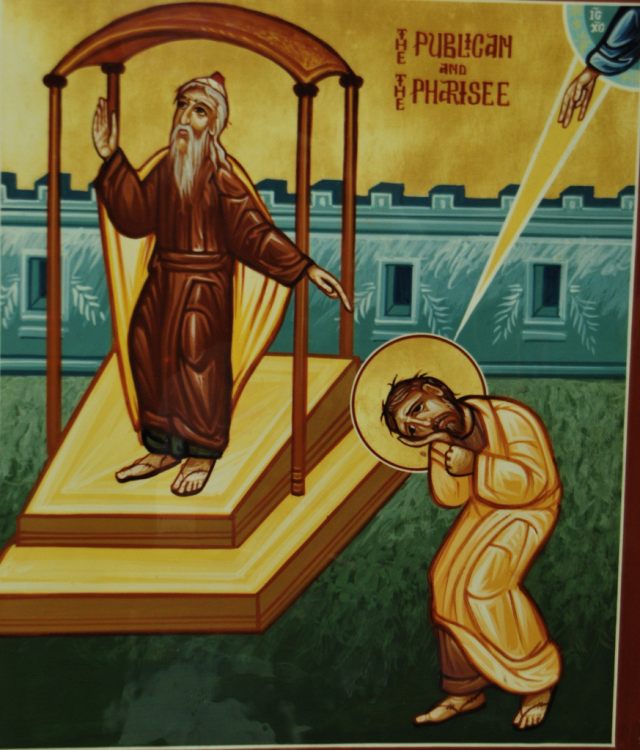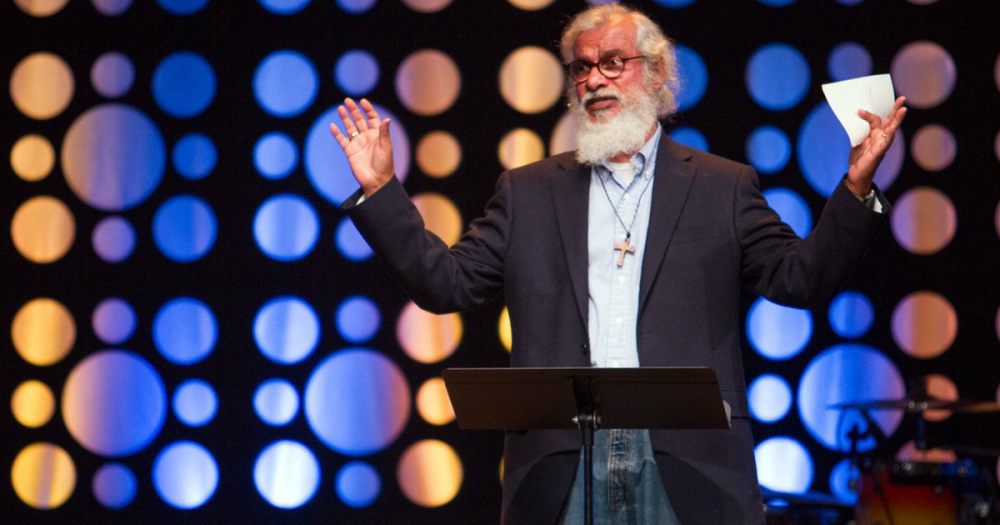-
Posts
60 -
Joined
-
Last visited
Everything posted by sermonindex
-
For many Christians in our day, the concept of Christianity begins with the reformation period of the 1500’s, often with little desired to be known about the church before that time. And so, like a vessel adrift in the sea of modern individualism, we have in many ways strayed from the original course marked out for us by the Apostles of the Lamb. An Identity Crisis This identity crisis has been manifesting itself in very strong and even unnecessary divisions forming in the body of Christ. And, though true disciples of the Lord must of necessity refuse what is heretical, many of these divisions are due to ignorance and misunderstanding, and have been brought about by the deceptive wiles of the Enemy of our souls. Another symptom of this identity crisis is the continual inventing of new doctrines and ideas. If there is no original belief or foundational understanding, then truth is essentially up to everyone’s own private interpretation of Scripture. In our day, there seem to be almost as many interpretations of Scripture as there are people reading those same Scriptures—along with an endless questioning and re-questioning of everything. With currently over 42,000 Christian denominations, the rugged individualism of Western thought has allowed an unprecedented explosion of everyone doing what is right in their own eyes. Yet, in the midst of the wilderness of this modern quandary there is a renewed hunger and thirst for Christianity in its purest form. Many are asking questions such as, “What did the original, early disciples of the Lord Jesus believe?”and, “How did they worship? Meet St. Clement Many of us would love have been given the chance to sit down with the Apostle Peter, or have a meal with Paul the Apostle. St. Clement may have done both! Born in AD 35 and ending his earthly journey in AD 99, Clement was contemporary with the twelve Apostles. Paul the Apostle mentions Clement in his Epistle as a co-worker: “I plead with Euodia and I plead with Syntyche to be of the same mind in the Lord. Yes, and I ask you, my true companion, help these women since they have contended at my side in the cause of the gospel, along with Clement and the rest of my co-workers, whose names are in the book of life.” Early Church Fathers Origen, Eusebius, Epiphanius, and Jerome, amongst others, hold to the view that this is a referral to St. Clement in the Scriptures. What an exciting thing to know that this name “Clement” now carries much more significance in our Bibles, he having been a co-worker with the Apostle Paul. Not only this, but he also went on to become to the bishop of Rome. Connecting The Dots For much of Church history the writings of the early Christians were available and the traditions of the Apostles and proper interpretation of the Scriptures were passed on. Since the reformation times unfortunately there was a divorcing of the historic interpretation of many practices of the Church and the interpretation of each reformer was more important. Of course there were lost doctrines that needed to be re-emphasized such as justification by faith. But many historic doctrines and beliefs were minimized at the same time. Not only a minimizing of doctrines was occurring but also a great confusion ensuing where each reformer had his own viewpoint. Some stayed very close to the early historic church such as Thomas crammer in the starting of the Anglican Church. But most reformers decided the Church councils and decisions made in the past did not matter and they would re-find all truth themselves with the Scriptures in hand. This sounds good at first glance but when each person saying that comes up with a different interpretation of what the Scripture verse means then we have more confusion than clarity. A way for us to minimize this confusion and muddying of the waters is to connect the dots from the first century Apostles in the Scriptures to the second century bishops and leaders in the Church who were established. St. Clement who we highlighted above was not only contemporary with the Apostles but discipled by them and ordained through their choosing as the bishop in Rome. A Needed Study It is of conviction that I believe evangelicals need to make a study of these early Christian leaders and see how the faith was passed on faithfully to the next generation. It is through this desire that I have compiled 3 books being released with samples of the writings of Clement of Rome, Ignatius of Antioch, and Polycarp of Symrna. All of these men were leaders in the Church, knew the Apostles and were ordained with their blessed in passing on the faith to the next generation. We can read their letters and I believe it will help give some clarity to Scriptures and the faith we hold precious in Jesus Christ. The first in the Early Church Father series on St Clement has been published and it can be read and downloaded freely Enter the world of first century Christianity, hear the heart of an early Christian leader. You might be surprised and also blessed in what you read. The Lord bless you.
- 38 replies
-
- st clement
- greg gordon
-
(and 1 more)
Tagged with:
-
Humble yourselves before the Lord, and he will lift you up. - James 4:10 Humility is the way to heaven. Christ was humble, the prophets of God were men of humility. The Apostles Jesus choose ended up being men of great humility. Saints in church history are considered those who reached a place of humility. Pride is everything that opposes Gods will and way. The demons are proud and love to come near those who are of a proud boastful spirit. Humility of heart drives satan from us. Humility is not just a sense of being but hundreds of daily choices we make. We can humble ourselves in a manifold amount of ways each day in our thought-life, actions we make, in relationships we are in. The Spirit of God is working with us daily to allow us to choose the right humble choices. Archimandrite Joel Giannakopoulos said rightly: "Humility is, not only to humble your own self, but also to forbear the humiliations which others impose on you." St. Chrysostom said: "For he that is humbled, and bruised in heart, will not be vainglorious, will not be wrathful, will not envy his neighbor, will not harbor any other passion." The Scriptures say to humble "yourselves." And to realize that when we do this we are doing it "before" the Lord not only men. God see's our hearts condition and honours humility. He longs and desires to "lift us up" and grant us His blessings safely as we maintain humility of heart. There are many steps to take towards humility, here is one practical step. Consider to pray out loud this "Litany of Humility" even daily if it becomes a help to you: O Jesus, meek and humble of heart, hear me From the desire of being esteemed, deliver me, Jesus From the desire of being loved, deliver me, Jesus. From the desire of being extolled, deliver me, Jesus. From the desire of being honoured, deliver me, Jesus. From the desire of being praised, deliver me, Jesus. From the desire of being preferred to others, deliver me, Jesus. From the desire of consulted, deliver me, Jesus. From the desire of being approved, deliver me, Jesus. From the fear of being humiliated, deliver me, Jesus. From the fear of being despised, deliver me, Jesus. From the fear of suffering rebukes, deliver me, Jesus. From the fear of being calumniated, deliver me, Jesus. From the fear of being forgotten, deliver me, Jesus. From the fear of being ridiculed, deliver me, Jesus. From the fear of being wronged, deliver me, Jesus. From the fear of being suspected, deliver me, Jesus. That others may be loved more than I, Jesus, grant me the grace to desire it. That others may be esteemed more than I, Jesus, grant me the grace to desire it. That in the opinion of the world, others may increase and I may decrease, Jesus, grant me the grace to desire it. That others may be chosen and I set aside, Jesus, grant me the grace to desire it. That others may be praised and I unnoticed, Jesus, grant me the grace to desire it. That others may be preferred to me in everything, Jesus, grant me the grace to desire it. That others may become holier than I, provided that I become as holy as I should, Jesus, grant me the grace to desire it.
- 1 reply
-
- 1
-

-
- humility
- greg gordon
-
(and 1 more)
Tagged with:
-
Here are ten specific principles that I have made a priority in my life and service to God that will be helpful to you as you seek to follow the Lord: Principles: 1. Submission All of us are placed under some type of authority. Jesus demonstrated this principle in the way that He submitted His own life to the authority of His Father. In the same way, we must be people of submission, willing to yield our rights and honor our Master in heaven by obeying the authorities He has set over us. 2. Contentment Whether it be a love for money and material things, the seeking of praise and position or something else that pulls at us, we must be a people who are content with the life the Lord has appointed for us. 3. Forgiveness People will wrong us—even people who work with us in service to God—and when they do, we must be quick to demonstrate Christ’s love toward them through offering forgiveness. Oftentimes, God actually uses offenses to make us more like Christ. Refusing to forgive leads to bitterness, which will hurt us and, in the end, actually destroy our service to Him. 4. Faith Throughout our lives and ministries, we will face impossible situations. Putting unshakable confidence in the written Word of God and remaining steadfast in the faith developed through it anchors and enables us to see the impossible become possible. 5. Truthfulness People often misrepresent facts for the sake of gaining approval. But to serve God in the way that pleases Him and brings Him honor, we must maintain honesty and truthfulness in our communication and dealings with people, no matter who they are. 6. Faithfulness No matter how educated, able or experienced a person is, he will never succeed without the virtue of loyalty in his heart and life. Faithfulness means that through thick or thin, good times or bad, we remain true to God and true to one another at all costs. 7. Humility This must be our foundation in life and ministry. Pride will destroy our lives and ministries faster than anything else. Therefore, we must be careful how we live, making sure that it is in brokenness and humility. 8. Love We must regard the principle of love as supreme in our lives and service, understanding the meaning of love and living it out in our words, attitudes, responses and actions. 9. Courage and Boldness It takes courage and boldness on our part to stand up and live in the truth of His Word and follow Him. Sometimes we may have to stand alone and sometimes it may cost us in significant ways, but it is worth it and pleases God. 10. Unselfishness Our worst enemy in following and serving Christ is often our own self-centeredness. How often we are tempted to grab for our own lives and look out for only ourselves! But as followers of Christ, we are called to lay down our lives for Him and for one another. Dr. KP Yohannan, founder and director of the nonprofit organization Gospel for Asia, has written more than 200 books, including Revolution in World Missions, an international bestseller with more than 4 million copies in print. He and his wife, Gisela, have two grown children, Daniel and Sarah, who both serve the Lord with their families. Gospel for Asia is a nonprofit organization serving the “least of these” in Asia since its beginning in 1979, often in places where no one else is serving. Gospel for Asia supports national workers who are serving as the hands and feet of Christ by ministering to people’s needs so they can understand the love of God for them for the first time. Gospel for Asia is engaged in dozens of projects, such as caring for poor children, slum dwellers and widows and orphans; providing clean water by funding wells; supporting medical missions; and meeting the needs of those in leprosy colonies. Through Gospel for Asia’s Bridge of Hope Program, tens of thousands of children are being rescued from the generational curses of poverty and hopelessness. Read more posts on Patheos by Dr. KP Yohannan Metropolitan, or on his blog at kpyohannan.org. Learn more about Principles. Learn more about Dr. KP Yohannan Metropolitan: Facebook | Radio | Amazon | Sermon Index | Goodreads | Twitter | OnePlace | About | Integrity | Book
-
It was nine in the morning when they crucified him. - Mark 15:25 The death of Jesus Christ is the most important day in the history of the world and for humanity. We recognize this day in our modern calendar by stating events are after the death of Christ or before the death of Christ. For eternity this was a timeless event where God dwells, it was an eternal sacrifice that was given once for all in time. We are trapped in time as mortal human beings, our days are few (Psalm 90:10). The significance of the death of Jesus Christ has been foreshadowed in the history of God's dealing with men. It also is the focal point of Christian worship in Holy Communion (1 Corinthians 11:26), Baptism of Water speaks of identifying with his death (Romans 6:3). The earliest Apostles Creed of the Church speaks of the death of Christ. The early Church choose the cross as one of the main symbols to represent their belief. In heaven we will be worshipping the Lord at the throne of God and thanking him for His death on the cross (Revelation 5:9). Sometimes we think little and do not mediate enough on the very death of our Lord which bought us to God and changed everything. In the Lord's Supper we "proclaim the Lord’s death" it is perhaps strange not the resurrection? It was in the death of Christ that the mystery of redemption was actuated. This focus on the death of Christ does not minimize the importance of the resurrection (Romans 10:9). What is fascinating is the hours of prayer which Early believers practiced, followed the actual events of the death of Christ. He was crucified in the third hour (Mark 15:25) Darkness covered the land at the sixth hour (Mark 15:33) At the ninth hour Jesus cried out and "breathed his last" (Mark 15:34). Some early believers saw great significance in this and through the hours of the prayer were reminded of the Lord's death and suffering. It is for us as believers to mediate upon and dwell on this death of Christ that gives us eternal life. There is an eternal richness to everything the son of God did especially his death on the cross. Hippolytus in the Apostolic Tradition, says, "For at that hour Christ was displayed nailed to the tree. Pray likewise at the time of the sixth hour. For as Christ was fixed on the wood of the cross that day was divided, and a great darkness descended. Therefore you should pray a powerful prayer at that hour. And they should pray at the ninth hour also a great prayer and give great praise. For at that hour Christ, pierced in the side, poured forth water and blood and lit up the rest of that day and brought it so to the evening." It was believed that "elders who handed on the tradition" practiced these times of prayer, what a sobering thought that we should as God's creation still ourselves during the time when the Lord was wounded for our transgressions. In eternity we will be praising and glorifying the Lord, honouring him forever for the great price he paid, may we start to do this now in our few days here on earth.
-
Then I looked and heard the voice of many angels, numbering thousands upon thousands, and ten thousand times ten thousand. They encircled the throne and the living creatures and the elders. In a loud voice they were saying: “Worthy is the Lamb, who was slain, to receive power and wealth and wisdom and strength and honor and glory and praise!” - Revelation 5:11-12 What a sight and spectacle! Myriads of those who fought the good fight, finished the race, following the Lamb of God. Now they are before Him! Gazing, bowing, prostrate, adoring, worshipping, weeping, that One who died for them. They are the sure ones (the martyrs), the one's that lived godly lives, who are examples for us in this life. Imagine them now before God's throne worshipping and exalting the Holy Son of God. We are prone in our Christian daily life to be fixated on ourselves. Our goals, problems, and just the daily grind of life that we are in. How healthy it is to think of the bigger picture, to reach we are not in an individualism Christianity that focuses only on my needs but rather we are in a corporate Christianity that is in community with each other. Christ calls us one body, and we are not just any body but the very body of Christ unified also with Him. Let your mind this day think upon heaven, consider all the saints who finished well who are in the presence of the Lamb of God even now. Imagine in heaven now Polycarp, Paul the Apostle, St. Benedict, John Wesley, Augustine, A.W. Tozer and a host of others all bowing before the Lord of glory. We must realize that in our daily life we are not separate from them but still one body in Christ. Consider to say this prayer out-loud: O HEAVENLY Father, who has knit together Your elect in one communion and fellowship, in the mystical body of Your Son Christ our Lord; Grant us grace so to follow Your blessed saints in all virtuous and godly living, that we may come to those unspeakable joys which You have prepared for those who unfeignedly love You; through Your Son Jesus Christ our Lord. Amen.
-
And having disarmed the powers and authorities, he made a public spectacle of them, triumphing over them by the cross. - Colossians 2:15 A sad occourence in some circles is the diminishing of the cross of Jesus Christ. We see in many Churches the cross being taken down in sanctuaries, other symbols being used in its stead. There are other more extreme cases where believers start to think of the cross as pagan, unbiblical and even not a cross but a pole as Jehovah Witnesses teach. This should not surprise us that there is enmity and division over the cross as a symbol as it bears the very message and death of the Person of God for a lost humanity. The enemy of our souls knows this and has and continues to oppose or pervert and mis-use its symbol. The cross gives us a powerful message and truth in visible form when looked upon. It says that the eternal God became flesh and submitted himself to death on the cross for humanity. It was death being trampled upon by the death of God. It was the triumphing over demonic hosts in the unseen. It is the love of God and forgiving of sins. Its very symbol speaks to the believer of life, the unbeliever of God's love and the demons of their defeat. When I was in a certain city, the Holy Spirit bore witness in my heart to wear a medium size cross around my neck with large rope. I was actively evangelizing unreached Punjabi peoples in the area with the Good News of Jesus. When I obeyed God and wore the cross an amazing thing happened, everywhere I went the Punjabi people seemed to see me very clearly and where drawn to me. I remember countless times in daily life where they would just stare and after I finished what I was doing, I would go and hand a scripture booklet to them. What that experience spoke to me was that bearing the cross of Christ in reference in a physical way had a spiritual impact. Whether they looked at me with my long beard and cross as a holy man or devoutly religious, I am not sure. But I could not deny the difference it made. It also made me councious that I was a bearer of this message of the Cross to the people daily. Another way the symbol of the cross was used in the early Church was by tracing it on the forehead and other ways. This practice began with water baptism and later became an accepted way of acknowledging the Lord and the death of Christ. Cyril an early church leader in AD. 310 wrote: "Let us not then be ashamed to confess the Crucified. Be the Cross our seal made with boldness by our fingers on our brow, and on everything; over the bread we eat, and the cups we drink; in our comings in, and goings out; before our sleep, when we lie down and when we rise up; when we are in the way, and when we are still." Martin Luther as other protestants carried on this tradition of the sign of the cross. Luther said, "In the morning, when you rise, you shall make the sign of the holy cross, and you shall say: In the name of the Father, and of the Son, and of the Holy Spirit. Amen. Then, kneeling or standing, you shall say the Apostles’ Creed and the Lord’s Prayer." This way of doing the sign of cross was to touch the fore-head, then the belly, then left shoulder, then right. This motion made a cross and it signified many things including, (1) acknowledging the Lord (2) declaring triumph over the enemy (3) testifying that our body, spirit and soul belong to God (4) putting in remembrance the death of Christ. Should all believers wear crosses, have cross symbols in their home or church, or make the visible sign of the cross daily? This question should make us ask another question first, Do I daily remember, praise and thank God for the Cross of Christ? Is it always in my remembrance? All of these traditions of the symbol of the cross are servants to the greater reality of the very death of Christ for each of us personally. Life, time, work, vocations distract us at times from the very purpose and person that everything is all about. M. Basilea Schlink says, "You were created and redeemed to focus on Jesus – on Him alone." St. Paul the apostle said that the cross was everything to him, it was his focus and boast (Galatians 6:14). Let us remember daily that it is this powerful cross that frees us from sin, satan and our own very self. Let it be in our gaze daily in all the motions of life. And hear the voice of your Lord saying "Remember Me", "Remember what I did for you." Yes, Lord we will remember you, let us not lose the wonder and holiness of your Cross.
- 5 replies
-
- 1
-

-
- cross
- cross of christ
-
(and 2 more)
Tagged with:
-
Who, being in very nature God, did not consider equality with God something to be used to his own advantage. - Philippians 2:6 When we are looking to progress in our understanding of the Lord we must look to the heart and what dwells within. Of all the least talked about sins in our day, Envy is near the top of the list. Perhaps one of the greatest roots of envy is the jealously that God is God and we are not. Such evil desires that desires more then what is given or deserved becomes a distortion of love and therefore is the opposite of love. Thomas Aquinas says of Envy: "Envy according to the aspect of its object is contrary to charity, whence the soul derives its spiritual life. Charity rejoices in our neighbor's good, while envy grieves over it." Envy is as old as Adam and Eve. Their firstborn son Cain envied Abel and killed him over extreme jealously. Cain envied Abel because God favored Abel's sacrifice over Cain's. Envy defiles a person and makes them hideous always seeking to put down others that they may be exalted. Of course this is not how it looks on the outside, it can even appear holy but inwardly the desires are evil. Saul envied David (1 Samuel 18:5-9). Isaac, envied the Philistines (Genesis 26:12-16). Envy cannot dwell with true godliness but with only that which is false, unspiritual and demonic (James 3:13-16). John R. Stott says, "Envy! Envy is the reverse side of a coin called vanity. Nobody is ever envious of others who is not first proud of himself." We can envy one's wealth, position, fame, title, honour, health, possessions and many other things. Only Christ who was the one that walked in true humility and did not even count his status as the Son of God important, but humbled himself to death and did not envy but died and emptied himself. In God's kingdom when we empty ourselves we are filled, when we die we live, when we humble ourselves we are exalted. When we envy we destroy ourselves. The holy Apostle Peter tells us to "put away envy" (1 Peter 2:1). Strike it away from yourself, be violent with such evil desires that arise in you. Have a remedy also for this poison of the heart. When someone is exalted rejoice! When you are lowered rejoice. Never desire anothers exaltation but rejoice that they have been blessed of God and praise God for such a thing. Be content with the gifts God has given you, the Heavenly Father is wise and all-knowing in what He has entrusted you with. Sadly when we envy we follow the error also of satan who envied the very throne of God but was cast down in judgment. Let our dying to envy show the evil one and all demons that we are of those who obey Jesus and are washed in the blood of the Lamb. Amen.
-
If you bite and devour each other, watch out or you will be destroyed by each other. - Galatians 5:15 It is unbelievable at times to see how even believers can disagree. One side sticks their feet in and the other side does also. No one is budging or willing to say they are wrong, both are right! Or so they think. Disagreements also happen in marriages, Churches and ministries. The world is helplessly divided as people have strong opinions on so many different topics and choices in life. These strong beliefs people have even come to the place where hurtful actions are taken against each other because of our desires to be right and have our own way (James 4:1). Many people are divided and hurt over differences in the body of Christ also as the Apostle James wrote to believers who were "warring" against each other. All these differences result in hurt lives, divided believers and the world looking on in shock and amazement at this scene. When we can claim to believe in the greatest news in the world that men can be freed from their sins and point to this life-giving Saviour but in the same breath speak evil of our other brethren that have been redeemed we bring a reproach to the world. The beautiful opposite of disagreements is agreement and unity. Our Lord says: That all of them may be one, Father, just as you are in me and I am in you. May they also be in us so that the world may believe that you have sent me. (John 17:21). St. Clement of Rome in AD 90 said, "“Love admits no schisms: love gives rise to no seditions: love does all things in harmony.” Christ is not divided neither is his body should be divided. When we humble ourselves and pick up our crosses we choose the low way below disagreements. It takes 2 brothers to argue and debate, but a humble brother will not answer back. Choose today to be an agent of peace and humility, this is pleasing to the Lord and allows His body to be beautiful to Him and the on looking world.
-
- christian life
- disagreements
-
(and 1 more)
Tagged with:
-
Stay here and keep watch with me. - Luke 26:38 We sometimes guage Christian life and spirituality in terms of what have accomplished or what we have done for God. One over-looked feature of spirituality is that of sharing the very heart of God. One almost revolts at the thought of such intimacy or closeness to God, but our Lord calls his disciples to stay with Him in his deepest hour of sorrow. Have you ever thought to ask God to share in his sorrows and heart for a broken humanity? If you were in Gethemane that night would you accept the call to watch with Jesus? Our Lord at times is seeking those who will simply "watch and pray" with him. Not seek great things in his name or big goals but to simply be at his feet, caring about how the Lord feels. In some way to minister to the very Lord himself. The Old Testament priesthood had this element of ministering and appeasing the Lord himself. While our Lord in the incarnation came into humanity he was touched and ministered to by the tears and the hair of a forgiven woman. As the world grows exceedingly worse in sin and evil, God's heart breaks even more for those he died for. Will we minister to the Lord's heart in such times when evil itself seems to triumph? When last has your heart been broken on the inside for those around you who were lost and without the hope of Christ? When last has a tear dropped from your eye for those who are on their way to a Christless eternity? There is a simple song sung in a Christian community that can be perhaps the echo of the Lord to our heart today: "Stay with me, remain here with me. Watch and pray, watch and pray. My heart is nearly broken with sorrow. Remain here with me, stay awake and pray." Will you hear the Lord's voice today? He is still waiting for you.
- 1 reply
-
- 4
-

-

-
- sorrow of god
- sorrow of jesus
-
(and 2 more)
Tagged with:
-
As the deer pants for streams of water, so my soul pants for you, my God. - Psalm 42:1 Julian of Norwich was a medieval follower of Christ. In a day of darkness where form so easily took over any sense of believers intimacy with Christ, she wrote a classic volume on knowing God's love. A quote from her writing says, "God, of thy goodness, give me Thyself; for Thou art enough for me." She came to the experience the wonderful way of seeking God alone for only Himself. She understood that in intimacy with God she found life and peace itself. This again is the heart and core of worship and the secret to a life of fullness and fruitfulness. The Heavenly Throne Room Recently when re-reading the book of Revelation, I saw again the wonderful picture of what our end goal is in Christian life. St. John recounts the majestic picture for us, "Then I saw a Lamb, looking as if it had been slain, standing at the center of the throne" (Revelation 5:6). The thought that struck me was that Christian life itself, its purpose, goal and meaning comes down to this one thing: "The wounded Lamb." This is the centerpiece of the heavenly throne room, the living Christ, the resurrected Christ. He is the one we see and the Throne of God where the heavenly Father sits. Oh, what glories are at His right hand. This, dear believer, is our goal and our ultimate purpose, to know this God, this "Lamb." To find our satisfaction in Him alone. The entirety of heaven revolves around His person and should not our earthly lives be the same? Fellowship With God God had always sought for fellowship with man and intimacy even when Adam and Eve sinned (Genesis 3:8). As Enoch walked with God (Genesis 5:22), we also should earnestly desire that inner life of communion with Him. We can always ask Him to increase that desire in us if we find it is lacking. The wonderful truth for us today is that God can be found and intimately known through His Son Jesus Christ. This abiding relationship can become a vibrant reality for us in every situation by the power of the indwelling Holy Spirit and the cleansing Blood of our Lord. Whether we find ourselves in a prison cell or in the most beautiful Church sanctuary, whether in a season of restfulness or a season of heaviness, He desires that we find Him in the midst of it all. God not only allows Himself to be found by us, He desires it. Yet it is altogether too easy to find ourselves filling life with times of christian songs, bible readings and even prayer, while missing true communion with Himself. God can be missed in these things when He is not sought for Himself, but only treated as a means to an end. We can sadly seek God to appease our guilty conscience alone, ask for temporal help and blessings, attend Church simply to check it off on our list of moral things to do. This is the picture of coming to a stream as the Psalmist portrays but then not being willing to drink of its goodness. A parched dry tongue, not willing to refresh itself in the very person of God who can only satisfy the longing of the soul. Practical Steps To Take Here are some practical ways to build and grow in our intimacy with Christ: 1. Remember it is Him and Him alone who we are to worship, when you come to a Church gathering bow your head slightly in reverence acknowledging God’s presence (Zechariah 2:13). Let your focus be on meeting God and not on going only to hear a sermon message about Him. 2. Throughout your day take times to quiet your heart and acknowledge the Lord. A moment of silence can be helpful (Psalm 46:10). One practice of the Early Church was to set aside times of the day for prayer. They followed what is called the hours of prayer which originated with the early Jewish believers. Some traditions vary but the times set apart to pray were 9am, noon and 3pm. Let this start to be a practice in your life of disciplined times to acknowledge the Lord you love dearly. 3. When taking Holy Communion (Lord’s Supper), understand that this is part of the heavenly worship of the slain Lamb and we are partaking in a holy way of worshipping God just like in Revelation 5 before the throne of God. Allow times of Holy Communion to be meaningful and build intimacy with you and the risen Lord. 4. From Martin Luther’s Small Catechism it says, “In the morning, when you rise, you shall make the sign of the holy cross, and you shall say: In the name of the Father, and of the Son, and of the Holy Spirit. Amen. Then, kneeling or standing, you shall say the Apostles’ Creed and the Lord’s Prayer.” The Church has always had traditions and practiced that helped us put our mind on heavenly things, re-center and focus on the Lord. The sign of the cross being a gesture you make by touching with your fore-finger and thumb, your forehead, then stomach, then left shoulder and finally right. You make a tracing of the cross over your body. What this says is, “I am not mine but the Lord’s, my body soul and spirit belong to Him.” It also reminds us “I am crucified with Christ.” This is one other helpful practice that believers have done throughout history to remind themselves of what really matters in life, the cross of Christ and our identifying with it. 5. Find some simple choruses that are very worshipful and meaningful. Think back to when you first knew the Lord and those songs that you sang over and over again in intimate worship. Bring your mind back to that place where time did not exist when you would worship the Lord and love to spend time with Him. Recapture these moments for the Lord has not changed (Malachi 3:6) but we have. Return to the first love you had—-He is waiting for you. And if you are not certain where to begin, begin especially by asking Him to draw you back to that place of first love. Returning Back to Intimacy Christian life always begins this way, when we see the great sacrifice of the cross of Christ, the wounded Lamb. We fall on our faces in worship in thankfulness for His love towards us. Daily we cannot help but praise and thank God, not because we have to but because of experiencing His love and person. But as life passes by, days become weeks and months become years, and amidst the cares of this life we are prone to wander from that place of intimacy, of worship, of seeking God alone. Perhaps this is a reminder for you; perhaps today God is calling to you saying, "My son, my daughter, come back to Me. Spend time with Me. I have longed for your fellowship and adoration. There you will find rest.” Then again our eyes will brim with tears and our hearts will fill with renewed love for the One that we will eternally be praising around the very throne of God.
- 1 reply
-
- 2
-

-
- intimacy with christ
- intimacy with god
- (and 3 more)
-
Yet I hold this against you: You have forsaken the love you had at first. - Revelation 2:4 Over the years we hear many explanations of the reasons why our Lord spoke so strongly to the Ephesian Church about their loss of their "first love." Our Lord summed up the entire Old Testament in one sentence, paraphrased: "Love God and Love Others." This love has action and proof to it. Intense and sincere devotion to Jesus Christ will produce a life of godliness and good works. Jesus was calling his Church back to practical worship, godliness and a denying of worldliness. They had hatred of evil, endured persecution in their society (Revelation 2:3), were able to spot false teachers and doctrines (Revelation 2:2) and even hated the major evil doctrine of the day taught by the deacon Nicolas (Revelation 2:6). Yet slowly love of pleasures were mingling into their affections for Jesus Christ alone. They passion they had for Him and Him alone was beginning to wane. Their looking to the cross and seeing the "lover of their souls" was something that lost its luster at least for a moment. Nicolas began as a full-hearted believer full of the Spirit of God (Acts 6:2-6). Yet slowly through self-importance he went away from the teaching of the Apostles and formed his own teaching and way. David Wilkerson says of Nicolas of Antoich, "The church fathers had two cardinal rules for believers - do not eat meat offered to idols and avoid fornication. Nicolas evidently fathered a doctrine that led to idolatry and fornication. The society of that day winked at sexual promiscuity. Nicolas and his followers invented a doctrine of false security that eventuated in mixture with the world and an undercurrent of sensuality in their teaching." Clement of Alexandria said of the Nicolaitans, "They abandoned themselves to pleasures like goats, in a life of shameless self indulgence." How do we not lose and forsake our love for the Son of God: 1. Look to Him alone for nothing else but Him. It is God that is our goal, not success, money, fame or anything else the world can offer. Give God your love and worship. 2. Pleasures are always fighting us for our affection for Jesus Christ. Our worship for Him must overcome and let Him be our satisfaction not passing worldly pleasures. 3. Look to the cross. It is there you find meaning, fulfillment, peace, joy and life eternal. Meditate on the cross. Daily thank the Lord for His death. 4. Look to yourself more then others. Instead of seeing others faults, look to your own. See the apostate deacon Nicolas in the early church as a warning sign to look inward in your own life. Are you submitting to what is the apostles doctrines today? Are you believing what the Church has always held to or are you trying to make your new teachings and ideas? The road to apostasy always begins with the separation from the people of God which leads to a leaving of God Himself. 5. Love others, find ways to do good to others. Think of others more then yourself. And you will find peace.
-
- 1
-

-
- love of god
- loving god
-
(and 4 more)
Tagged with:
-
Praise be to the God and Father of our Lord Jesus Christ! In his great mercy he has given us new birth into a living hope through the resurrection of Jesus Christ from the dead. - 1 Peter 1:3Sometimes our life seems to spiritually become foggy and we lose sight of what really matters. Pressures, trials, circumstances come in like weeds crowding out the very purpose and reason why we exist. When we lose sight of the cross, when we begin to lose our desire to praise and thank the Lord, we can know that we are failing to really focus on the matter of first importance. Christ was the one that became flesh, who shared our humanity. He suffered and died, and God resurrected him. He is our hope, our sure foundation, our mighty fortress, our promise of eternal life. Our response must be praise, thanksgiving, a singing of hallelujah. As St. Peter opened his epistle with "praise" we should also begin each day with praise to our God.There is a wonderful chorus that goes: "Thank you Jesus, Thank you Jesus, Thank you Jesus, Thank you Jesus, Thank you Jesus, Ha-Hallelujah, Ha-Hallelujah, Ha-Hallelujah, Ha-Hallelujah, Ha-Hallelujah." Take time even now while reading this short mediation to praise Jesus, He is longing for your adoration. Look again to the cross, see its beauty and glory. Glorify the risen saviour who paid so much for you. Thank Him who died for you. Heaven will be filled with praise and thanksgiving. God is looking for worshippers in the work of the Lord. It has been noted by godly men that we sing songs about God but our need is to sing worship to Him. Jesus deserves and desires this attention and focus. God alone our goal and sight. Look to Him today, take time to praise Him. This will be our heavenly occupation, enjoy it now.
- 2 replies
-
- 3
-

-

-
- jesus
- praising god
-
(and 1 more)
Tagged with:
-
St. Paul writes to Timothy giving us a picture of how it will look just before the second coming of the Lord. He shares that people will be “unloving, unforgiving, slanderers, without self-control, brutal, despisers of good” (2 Timothy 3:3). In the end times there will be a great shift in how people live and act worldwide. Jesus spoke of children who will betray parents and how people will even want to put Christians to death (Matthew 24:9-10). But we see the root of the issue in the attitudes of human hearts, and committed believers in Jesus Christ are not excluded. Not having love, not forgiving, and speaking evil of other good believers will be just part of the coming spirit of anti-Christ in the world. Unforgiveness is a prison, a torturer. It will rob us of our joy, peace and even physical health. Jesus knew mankind and he knew that a great problem that many deal with is forgiving others. It is one of our Lord’s primary teachings and the apostles were very keen to this. Peter said to Jesus in answer to his question of forgiveness, seven times! He understood that Jesus said to be extravagant in our forgiveness of others, and the current teaching by rabbis in that day was to forgive three times and then seek revenge. Our Lord’s response showed the extent of how God forgives and how those who claim to follow him should forgive, “I tell you, not seven times, but seventy-seven times” (Matthew 18:22). Do you find it hard to forgive other brothers and sisters in the Lord? Do you find it hard to love others in the body of Christ because of hurtful things that were done to you? Are you speaking evil of those brothers and sisters and judging them? It is very important that we are clear of all such sin and are full of love, forgiveness and using our mouths to show mercy and love to others in order to restore them (Galatians 5:1). Early believers lived in great anticipation of the coming of the Lord, and the thought of holding a grudge in unforgiveness with a believer and then entering eternity with this sin was unthinkable. In speaking about disputes, St. James writes, “Don’t grumble against one another” (James 5:9). The terrible reality to him was that the Judge was standing at the door, the Lord was coming back soon.
- 6 replies
-
- unforgiveness
- forgiveness
-
(and 2 more)
Tagged with:
-
Criticism is a great danger in the Church in our day where many are even thinking they are doing God a favour by being critical against others. K.P. Yohannan shares ways we can overcome criticism that is directed towards us and understand why people do these things so we can have empathy and compassion for them. Currently we are featuring on SermonIndex.net a sermon on Bitterness by K.P. Yohannan which goes into detail of why believers end up acting in these ways. Only with God’s help through forgiveness can we be freed of this sin and start to live in a way where we bless and not condemn others. Read below what K.P. Yohannan says about Criticism: — In our world, it seems impossible to escape criticism. If we do poorly at school or at work, people will criticize us. Should we do well and excel in business, we still face criticism from people who are jealous of our success. It seems to be a favorite pastime of the human race to take one person after another, good or bad, and “skin them alive” with criticism. What makes people act this way? Psychologists say one of the underlying reasons people criticize each other is to take revenge for the hurts they once received. Whether deserved or not, criticism is always painful. No one likes it. Yet people seem to enjoy themselves when others are cut down. Most believers have accepted the fact that the world will criticize us regardless of how saintly we may live or how many charitable contributions we may make. However, I have found that the greatest shock and discouragement for believers come when they realize that they encounter this same heartless criticism from their brothers and sisters in the Body of Christ. Of course, God never meant this to happen. But many Christians have never allowed the Lord to cleanse their lives from this destructive behavior. It’s a very serious problem; and if it is not dealt with, it easily can destroy a church. Imagine this: Jesus, the sinless Son of God, faced His worst criticism—not from the Roman government or from ungodly people—but from the most recognized and pious religious leaders of His nation. Paul experienced the same thing. His worst critics were people inside the Church, not the heathen he tried to win. In fact, he deals very thoroughly with this problem in his second letter to the church in Corinth. Whether criticism comes from the world or from within the Church, it is important for us to know how we should respond to it. Here are a few ways to Overcome: 1. Not To Pay Back - The Bible clearly instructs us in Romans 12:17 not to pay back evil for evil, which means we must not lash out and respond in anger in the same manner we were treated. 2. Maintain Love - On the contrary, God wants us to respond differently. We are to maintain our love for the brothers and trust the Lord to handle our defence. Only if we do this will the cycle of destructive criticism be broken. 3. Say No to Discouragement - The feelings of deep hurt and discouragement that follow criticism can easily bring us to a point of despair, giving up our calling or even suicide. In no way must we allow this to happen! If we give in, the enemy has reached his goal of stopping us from building God’s kingdom. 4. Look Objectively - The best we can do when we receive criticism is to look at it objectively. If the accusations are simply empty talk, we should dismiss them and by God’s grace go on with our life. 5. Be Willing to Change - Lastly, On the other hand, if there is any truth in the criticism, let us be willing to change, improve and grow in that area.
- 3 replies
-
- kp yohannan
- gospel for asia
-
(and 2 more)
Tagged with:
-
He then began to teach them that the Son of Man must suffer many things and be rejected by the elders, the chief priests and the teachers of the law, and that he must be killed and after three days rise again. - Mark 8:31 The Nicene Creed The Nicene Creed declares of the Son of God, What a wonderful statement to consider and think about. Our faith in death and resurrection of Christ are the non-negotiables that we must hold to tightly and dwell on continually. There is an unfathomable depth of richness in these simple statements that should release us on a life of holy contemplation of the sufferings of our Lord. Commemoration of the Death of Christ The early Church remebered the suffering of the Lord and resurrection daily but also commemorated it yearly on a specific day. That day was debated at first and various local believers practiced different days but soon a universal day was recognized. This yearly consideration of the death and ressurection of Christ allows for a season of very deep meditation on the death of the Son of God for us and should greatly deepen us in our holy faith. Some accuse those who practice the yearly memorial that they are missing a daily thinking of the death of Christ but nothing is perhaps further from the truth. The early believers saw the death of Christ in everything, the bleeding side was thought to where the very Church was born (John 19:34), daily many believers will recite the nicene creed or others that speak of the death of Christ, the cross was widely used as a symbol in churches and homes and was a daily reminder of the death of Christ. It should rather be asked to modern believers where churches are removing crosses, are we remembering the Lord's death enough? Jesus Died Jesus died for our sins! It is not a phrase that we should glib over lightily but heaven is consumed with this constantly, the heavenly choruses never end glorifying the son of God who died for all races, peoples and humanity. The incarnation is part of the sufferings of the Godhead in which God humbled himself to save humanity. Every accusation, misunderstanding, evil look, secret plot, word of gossip, slander, all hurt the Son of God's heart. He suffered so many things for us, willingly laying down his life continually on the earth for 33 years (12,000+ days). Every day it was a conscious choice of the son of God to bear the shame for us so that we could be free. In the end with blood stained eyes he looks at humanity killing him and has only love for this is the reason he came. His final foe was death, that he would trample victoriously, as an early liturgy says, "Trampling down death by death." His death defeated all death and in him is life everlasting, resurrection life. We are invited during this season of lent and holy week to consider again what we remind ourselves daily, the great suffering, death and resurrection of our Lord. May it become richer and more meaningful to us each year, as we are simply preparing to enter into the fullness of worship in heaven, declaring to the Lamb: "you were slain, and with your blood you purchased for God" (Revelation 5:9). Amen.
- 1 reply
-
- death of christ
- lent
-
(and 2 more)
Tagged with:
-
But if you do not forgive others their sins, your Father will not forgive your sins. – Matthew 6:15 Lesson of Forgiveness Sometimes the lesson of forgiveness can only be obtained through being the recipient of someone not being willing to forgive you. If we have been hurt in our past by someone we can be those who will not forgive others who hurt us. When we do not release others we end up not releasing ourselves. Even physical ailments can be a result of this pent up hurt and unforgiveness that manifests itself in bitterness, envy, resentment and even anger. For a Christian to hold onto any grudge or anger towards someone in the body of Christ affects not just themselves but others are defiled by their sin. It is not only a sin to not forgive but as we do this we enter into the strategy of satan because the demonic world is a world of unforgiveness. Not offering forgiveness is to not offer the love of Christ to another believer. We have received unmerited grace and forgiveness but then we say to someone “I will not forgive you,” we are doing what is opposite than Christ. When we do not forgive we show that we do not love Jesus because if we love him we will obey his commands. And his command is to forgive all. Jesus Suffered On the Cross Jesus on the cross suffered for your sins and he forgave you, he offered you this forgiveness and when we accept it, we become Christians. Jesus the Son of God on the cross was mocked, ridiculed and given a sponge with vinegar that some argue was used for cleaning in the washroom of Romans. If anyone had the right to be unforgiving, vengeful, angry and seek justice it would have been Jesus. But what is the reaction, he says “Forgive them.” He says to God the Father please do not hold these things against those who have hurt me so much. Please not only that please put their punishment on me so that they can be set free. We can share in the heart of Jesus that through our pains and hurts we can be able to help set others free through bearing the hurt with the love of Jesus Christ. Does this excuse sin? No, but it does allow healing and help for those who sin and we become more like the character of God towards others. In the light of sins against Jesus Christ, the sins others do to us are very little. The teaching of Jesus even goes further that if we do not release and forgive others, God will not forgive our sins or hold some of them against us. Lord, help me to forgive and fully release others as we all stand by your grace. Amen.
-
The Roman Coliseum was one of the main centers for entertainment and, on this day, it was not gladiators or sports competitions, but a different type of crown was being competed for. Rows upon rows of circular seating, with humanity throbbing inside. Fifty thousand faces fixed their attention on the scene below. The noise at times was deafening with cheers of the crowd, anticipating what was to come. To whet the appetites of the onlooking romans, gladiators were sent out to fight. Then wild animals who were starved were released, and a skillful gladiator would kill each one. But all of this is just to prepare the crowd for the main event and attraction. It was the Christians that were competing today for a heavenly crown following the way of Christ in the noble way of martyrdom. What happens next, The Martyr of the Catacombs, details the sad scene well for us: This is an excerpt from the free Christian ebook, The Following of Christ by Greg Gordon.
- 1 reply
-
- greg gordon
- the following of christ
- (and 2 more)
-
When pride comes, then comes disgrace, but with humility comes wisdom. - Proverbs 11:2 Pride and the Devil When we speak of pride we also often times think of the devil. He was the beautiful angel who through transgression and pride fell from his place with God to a fallen state. Lucifer, an anointed cherub of God became the devil, the father of lies (John 8:44). He was soiled and became filthy and the enemy wants to defile all those who are unsoiled also. When we are free from pride the enemy of our souls desires to sow prideful thoughts into our life. Pride is a preoccupation with self, it is to say that I am more important then all others. Pride says "I" am always right. Pride is when at all costs we need to revenge ourselves of our abusers. Pride says that we are more important then others and when sinned against our rights are more important. Personal glory and importance leads to a proud heart and opposition to God (1 Peter 5:5). Pride and Selflessness Pride is in some ways the opposite of selflessness. When we are humble we seek the good of others even when we have been hurt by someone. Disgrace and shame comes with pride because God diminishes the proud one under his own displeasure. Just like Nebuchadnezzar and Belshazzar, we can be blinded by Pride and a sense of self-importance thinking we are able to control situations and even people. This is a profound thought that God himself shows everyone grace, mercy, and gives constant help. And when we see others in the body of Christ fail, or cause abuse, if we become proud, judge them overly and do not do it all in love, we can have God's grace lifted from our lives. And the sad result can be the brother who fails, when we judge him we can become worse then that brother. When we have pride against others in the body of Christ we have insulted the Creator Himself. We should never look down on others, never think we are better especially when we see another of our brothers and sisters fail. The Publican and Pharisee In Luke 18:9-14, we see the famous story of the Publican and Pharisee. It is a great contrast between pride and humility, self-assuredness and humility. The first error of the religious leader Jesus pointed out was of being "confident." It was a self-reliant attitude that I am in a better place with God then most and therefore can speak down to others and also not need God's grace as much. It is a subtle deception on the road towards knowing God we can start to trust on our past experiences of grace and not rely on the grace of God daily. And what happened? The religious leader, "looked down on everyone else" (Luke 18:9). He did not take the humble role of a being below others as a servant but rather assumed priority over others. In such a contrast we see the Publican come to our Lord and simply say in humility, "God, have mercy on me, a sinner." (Luke 18:13). This one humbled himself before God, no matter how holy or progressed in our Christian lives when we humble ourselves we keep our position of walking with God in His presence. But once we exalt ourselves then we are cast away. In a famous drawing of this scene, we see the Publican bowing and humble, and the Pharise exalted and with one hand judging the other and the other praising God. Then in the picture we notice the hand of God blessing with grace and mercy the Publican only. Let this be a reminder that when we judge others we cannot praise God with the same breath and miss God's blessing in the process. Serving Others In the Body When we have pride in our own accomplishments and skills we are taking the credit for these things to ourselves. The reality is all giftings given to brethren in the body of Christ is to serve and help others, not ourselves. To follow the way of pride is to follow the way of the devil. The follow the way of humility is to follow in the way of the Lord.
-
- greg gordon
- humility
-
(and 3 more)
Tagged with:
-
I am afraid that when I come again my God will humble me before you, and I will be grieved over many who have sinned earlier and have not repented of the impurity, sexual sin and debauchery in which they have indulged. - 2 Corinthians 12:21 There are many tests for the humility of our walk with Christ. One of them is how we react to correction and namely correction by spiritual leaders in the body of Christ. It is never easy to consider we have been wrong in an area of our life and our decisions have caused hurt towards others. Paul the Apostle was encouraging the Corinthian believers to repent fully of their past behaviours, he was full of grace towards them that they could change. But sadly in the 2nd letter he wrote to them at the end he started to doubt whether they had changed. He wrote, I fear there would be "discord, jealousy, fits of rage, selfish ambition, slander, gossip, arrogance and disorder" (2 Corinthians 12:20) still among you! An arrogant attitude says I am never wrong, it says people need to listen to me. Arrogant, proud, haughty men were in the Corinthian church who were not even listening to leaders in their gatherings and were rejecting the Apostle Paul himself. You could possibly hear one of them saying, "I have no authority over me, I only submit to Christ!" It sounds spiritual but in the end such an attitude is of a decieved individual who is found apart from Christ in his pride. The Corinthians were submitting to what Paul called, "super apostles" (2 Corinthians 12:11). These men where ear-tickling preachers that told the people what they wanted to hear. One thing they did not speak about was sexual sins or against disorder and discord in the body. All they probably wanted was the peoples money and esteem. Paul highlights at the end of his letter that "many" have "not repented of the impurity, sexual sin and debauchery in which they have indulged." No wonder they were not correcting a young man who was in incest (1 Corinthians 5). What shocked me is when I read the word "many"! The Corinthian Church was compromised and were neglecting the cure to their ills which was godly leadership and true spiritual elders guiding them. They were blind leading the blind into lives of sin and selfishness. The end was many who were slandering each other, name-calling, talking behind backs and ultimately division in the body of Christ, something that grieves the heart of God. Paul labored with them and sought to visit them again to spend time with these children of God and tend them like a Shepherd. This comes close to home for us, are we willing to submit to correction by spiritual leaders in the areas of our lives that are amiss. Or do we seek to always justify ourselves and not accept even the godliest of men who counsel against our decisions. Our way of repentance is to humble ourselves under such correction and allow Christ to start to be formed in us again.
- 4 replies
-
- spiritual leaders
- corinthian church
-
(and 1 more)
Tagged with:
-
He was a murderer from the beginning, not holding to the truth, for there is no truth in him. When he lies, he speaks his native language, for he is a liar and the father of lies. - John 8:44 We have to remember that Satan is the father of lies. He is a murderer from the beginning and dwells in falsehood. He never wants the glory to go to Jesus Christ but rather twists the truth and deceives those in the Lord’s work to take glory to themselves. Satan is also the master counterfeiter who has been deceiving God’s people since the beginning. He spoke to Eve and deceived her by twisting the truth of God saying, “Has God indeed said?” Such twisting of the truth is his normal activity. Since the earliest days of the apostles, even with our Lord himself, there were deceivers and false brethren present: those who secretly come into God’s flock for personal gain and to infiltrate the liberty of the believers, betrayers, deceivers, false brethren, false prophets, and those desiring preeminence among the saints (3 John 1:9). Diotrephes and one's like him did not seek honour in the church as much as sought his own truth, his own way and seperated himself from the doctrines of the Apostles and all the other Churches. He was stubborn to think he was right and all others were wrong. A false teacher is always who is in admidst but then seeks to draw people "out of" towards themselves. Just like satan, these false teachers do not have, "the truth in them." One key to understand the working of God versus Satan in a meeting of believers is the emphasis put on the Son of God. Those that worship, honor, and glorify the Holy Spirit more than Jesus Christ are not led by the Holy Spirit to do that. The Holy Spirit will always honor Jesus Christ; thus the true working of the Spirit can be distinguished in measure. The Scripture states: “He shall not speak of himself” (John 16:13). All early Church creed statements always elevate the work of the cross and the incarnation of the Son of God. In the end times, there will be an influx of those in the Church teaching doctrines of demons to deceive even the elect of God. There will be many false teachers who claim to be of the truth but are not. The most dangerous weapon against the Church is not persecution, but deception. One key feature of these deceptions is that there is something new offered, when rather we should be seeking to believe the truth that is old and that which the Church has held to from the beginning.
- 166 replies
-
- satan
- counterfeit
-
(and 1 more)
Tagged with:
-

K.P. Yohannan: 3 Reasons Why Our Hearts Become Hard
sermonindex replied to sermonindex's topic in General Discussion
Excellent replies. Towards allegations these are un-proved and just allegations that got picked up by online christian news. I would talk directly with Gospel for Asia. -

K.P. Yohannan: 3 Reasons Why Our Hearts Become Hard
sermonindex posted a topic in General Discussion
“This is the word that came to Jeremiah from the Lord: ‘Go down to the potter’s house, and there I will give you my message.’ So I went down to the potter’s house, and I saw him working at the wheel. But the pot he was shaping from the clay was marred in his hands; so the potter formed it into another pot, shaping it as seemed best to him” (Jeremiah 18:1-4). We see the picture of a Potter with the clay, working on it over and over again. He was able to re-shape the clay because it was soft. In our Christian lives our hearts can become hard and therefore God is not able to speak to us or help us change our ways. Let us listen to Bible teacher K.P. Yohannan as he gives us 3 reasons for our hearts becoming hard and 6 wonderful remedies for our heart to remain soft in our walks with God. — What Causes Our Hearts to Become Hard? 1. Being poisoned by negative talk. One person in a church or ministry is dissatisfied, bitter, critical and unwilling to change. He starts to talk negatively and poisons others. Soon the atmosphere of love among the brothers and sisters is replaced by disunity, anger and hardness of heart toward each other and the Lord. 2. An elevated view of ourselves. We feel important because we do something significant for God's Kingdom, and we don't recognize that our heart is filled with pride, arrogance and an exalted view of ourselves. Often the symptoms don't show up until years later when our heart is no longer soft in the Potter's hand. 3. Rebellion. Any form of rebellion is like a tiny seed that, if not dealt with, will grow and eventually harden our heart and bring destruction. It begins with a tiny issue or a thought like this one: “Who does he think he is to tell me what to do? My life is none of his business!”—and it ultimately ends in death. What Should We Do to Keep Our Hearts Soft? 1. Don't take God's grace for granted. Grace is given to those who are humble, not to those who are right or feel indispensable. 2. Watch over your heart (Proverbs 4:23). Don't keep company with those who spread negative talk, sow disunity or have a rebellious spirit. Love them and pray for them, but have no part with them. Believe me, you and I are not strong enough to withstand the poison they spread. It's in the atmosphere, and we breathe it in whether we intend to or not. 3. Submit to one another (Ephesians 5:21). Don't fight for your rights. Be willing to give up something. Learn to let it be. 4. Don't think of yourself more highly than you should (Romans 12:3). Remember that all the gifts, talents and ministry you have are given to you by the Lord. Nothing is of yourself. It's all God's grace. 5. Be careful from whom you receive your counsel. That's especially important when you are disappointed because your expectations are not met. Don't go to a brother or sister who is not mature in the Lord and who sympathizes and agrees with your complaints and tears. Instead, go to someone who is mature and who can help you see the hand of God and His purpose behind the things you face. 6. Repent and run to the cross. If need be, do this a thousand times a day to maintain the tenderness of your heart. Whenever you seek the limelight, want to take credit, get hurt or when your expectations are not fulfilled and your plans don't work out, don't fight; go to the cross. God always seeks to do one thing with us on the Potter's wheel—not to make us more powerful and famous, but to make us more like His Son, the Lord Jesus. -
Since they would not accept my advice and spurned my rebuke, they will eat the fruit of their ways and be filled with the fruit of their schemes. - Proverbs 1:30-31 We have all had times in our lives where believers in the Lord have given advice to us in our Christian walks. Sometimes it was a kind reminder of a verse or a practical suggestion in a situation. Other times it could even be an extreme "Thus saith the Lord." What do we do with such counsel we recieve in our lives? Do we accept counsel that we at first disagree with or is contrary to what we are doing or think? In my own live there were various times that I recieved godly counsel that I knew deep down in my heart was right but was against what I wanted and desired. Other times I have recieved strong words from brothers that was very extreme and in the end I needed to weigh it with other counsel and how Church history also believed on the issue. But one way we can know that counsel is sound is if it accords with the Scriptures and secondly if it is counsel that many other godly men agree with. Such counsel should be weighed carefully and it is dangerous to reject such warnings as in the end we might be fighting against God Himself. Many believers in our day are quick to give their opinions but godly Elders and leaders in the body of Christ, pray and hear from God clearly to sound a warning or help for someone. It is not dangerous to reject someone's opinion or thinking on an issue but to reject strong godly counsel from a church leader can lead to a life full of hurt and even destruction. If we cannot recieve counsel and instruction we become foolish no matter how prosperous we are in life (Ecclesiastes 4:13). We can start to hate being corrected or having counsel that goes against our thinking (Proverbs 5:12). When we reject godly counsel over time we end up rejecting the Lord Himself (Proverbs 1:25-26). We become right in our own eyes in every situation (Proverbs 12:15). C.S. Lewis says, "There is nothing progressive about being pig headed and refusing to admit a mistake." Be willing to admit failure, admit that your way is not always right. Admit you allowed a mistake. Such humbling of one's self will open your heart to hear godly counsel again, and allow the Lord to direct your paths. When we put pressure, control and our own reasoning upon a situation it can seem we are right but in the light of Scriptures and godly counsel the actual truth can be revealed. The warning in the verse in Proverbs is that the worse thing that can happen, is the Lord simply will allow us to be filled with the "fruit of our ways" and the end result of our own scheming. May God have mercy and allow us to always be willing to hear the advice of others, especially godly elders and mature believers in the Lord. Such an open heart will save us from many trials and lead us in the way of blessing with the Lord.
-
And forgive us our debts, as we also have forgiven our debtors. – Matthew 6:12 What is the hardest thing we have to do in life? It is no understatement that when you totally forgive someone it could be one of the hardest things you do in your christian life. Our Lord includes forgiveness in the Lord’s Prayer as its one of the struggles that we will all have to deal with in life. Forgiveness is not an option but it is essential in our lives as even our Lord says that God will forgive us in relation to how we forgive others. Unfaithfulness, abuse, hurt, slander, and hundreds of other ways one can offend and cause one to have unforgiveness against someone. Forgiveness is a deliberate choice consciously to release feelings of resentment, hurt and vengeance towards another, though they do not deserve it. Not forgiving someone in your life can even cause physical problems, mental problems and definitely spiritual problems. Releasing someone in forgiveness is not holding that sin or hurt against another. To forgive is to fully release someone and bless them though they should be punished, or you could exact vengeance. Only when we forgive we can bless someone and pray for them to help them. But you say, “how can I fully forgive someone? and even bless them, they deserve to be corrected for their behaviour.” In famous chapter on love, we are told that “it keeps no record of wrongs” (1 Corinthians 13:5). God’s desire for us is to forgive as Christ forgave us, that means to not hold sins against others and to bless them as our Lord blesses us. Vengeance is the Lords, but we should never wish even those who have hurt us, to be punished by the Lord and even be sent to hell. Forgiveness gives us joy and peace. When we dwell on grudges against others our body is affected physically and we start to have all sorts of problems of health. Forgiveness restores relationships, marriages and situations in the body of Christ. When we totally forgive someone we do not need to speak about it to others. Most people do not realize the extent they have hurt someone and therefore do not even understand they need to seek forgiveness. Therefore seek to forgive people privately even just before the Lord, give the situation, person, sin to the grace of God and never mention it to the other. Such releasing of debts and feelings to the Lord will bring great growth in your relationship with the Lord and will help you keep protected from the attacks of the devil. C.S. Lewis says, “To be a Christian means to forgive the inexcusable, because God has forgiven the inexcusable in you.” Are you holding onto that terrible inexcusable thing, what hurt are you holding onto? Fully forgive, bless and you will find you will be walking in the footsteps of Jesus.
-
Do not judge, and you will not be judged. Do not condemn, and you will not be condemned. Forgive, and you will be forgiven. – Luke 6:37 You will never have to forgive anyone more then you yourself have been forgiven by God. Unforgiveness will leave you miserable. We forgive for our own happiness and benefit. When we do not forgive resentment and bitterness can defile all aspects of one’s life. Forgiving means to give up all resentment and the ability to exact revenge to get even. As we are called to be more like the Son of God (1 John 2:6) we can know how much we are in his likeness by our love and forgivenness of others. You know the grace of God as much as you are able to show it to others. No one will ever deserve to be forgiven, we must forgive because God forgives us. We judge and condemn others because we have not forgiven them and have not sought to bless them and see them bettered. When we pray the Lord’s Prayer (Matthew 6:9-13) we say to the Lord: “Come, O Lord, and forgive me my sins even as I forgive those who sin against me.” On speaking of those who would come to partake of communion with unforgiveness John Chrysostom says, “As it is not to be imagined that the fornicator and the blasphemer can partake of the sacred Table, so it is impossible that he who has an enemy, and bears malice, can enjoy Holy Communion.” Our Lord teaches us to seek forgiveness first before worshipping God, for we ourselves need forgiveness to enter into his holy presence (Matthew 5:24). Of the many sins we can commit unforgiveness is a terrible sin, it is refusing to do what God himself did in offering his Son to forgive our sins. When we harbour unforgiveness we are helping the devil to expand his kingdom as it is a kingdom of accusation, unforgiveness, slander, lies and evil. John of Kronstadt says, “Forgive them that trespass against you with joy, as a good son rejoices when he has a chance of fulfilling the will of his beloved father.” Father in heaven give me a new realization of the great forgiveness you offer me daily so that I may be able to have more grace and forgivenness to all men. And allow me to release and forgive anyone who has hurt me and caused me pain. Amen. from: https://gregjgordon.wordpress.com/2015/06/07/harbouring-unforgivenness-towards-another/
- 3 replies
-
- unforgiveness
- abuse
-
(and 1 more)
Tagged with:


